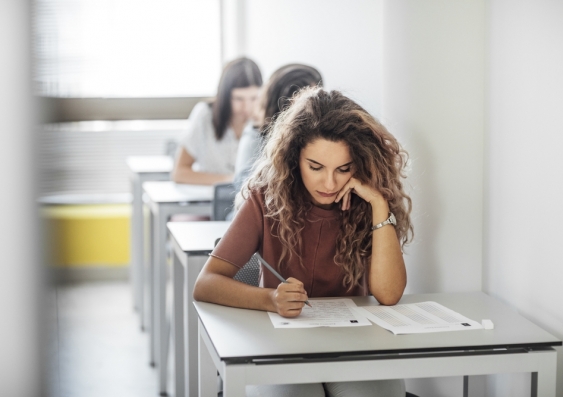'Soft' skills and parental support key to navigating Year 12 during COVID-19
Adaptability, aspirations and parents will help school leavers perform during the pandemic, say UNSW education experts.
Adaptability, aspirations and parents will help school leavers perform during the pandemic, say UNSW education experts.

Students who develop strong ‘soft skills’ may be better placed to navigate Year 12 during the pandemic, say UNSW education experts.
Focusing on cultivating adaptability and positive aspirations will help students achieve their best outcomes, say Scientia Professor Andrew Martin and Associate Professor Jihyun Lee from UNSW Arts & Social Sciences.
This school year has been characterised by unpredictability and change. Prof. Martin, an expert in educational psychology, says adaptability is “important for dealing with uncertainty and change and disruption…
“Disruption has the potential for having negative effects on [students’] wellbeing. But also disruption can be positive if it's navigated effectively,” he says.
Making a conscious effort to adapt to the ‘new normal’ of COVID-19 will allow students greater scope to achieve optimal educational outcomes, he says.
Breaking adaptability down into three parts can be helpful for young people dealing with disruption, Prof. Martin says:
“That doesn't mean it's easy, but these are the three response areas that we find [help] people … navigate, change and uncertainty and disruption effectively,” he says.
Associate Professor Jihyun Lee, an expert in educational assessment and measurement in the UNSW School of Education, says self-efficacy – or having a ‘can-do’ attitude – and strong aspirations are two of the best predictors of positive educational outcomes.
Also students who see study at “university as more of an opportunity to do more valuable things, including further study,” are more likely to do well than those that look at study as an end goal, she says.

Scientia Professor Andrew Martin and Associate Professor Jihyun Lee, UNSW School of Education. Photo: UNSW
A/Prof. Lee’s most recent PISA-led research has looked at fifteen-year-old students’ feelings of wellbeing around the world in relationship to variables including peer-support and socio-economic status.
“And the finding was, in a way, really surprising – to me anyhow. The assumption is that when students get to teenagers, … they drift to friendships, and so on. But … [for] every single country, the best predictor of students’ wellbeing was parental support,” A/Prof. Lee says.
During COVID, the relationship with your parents becomes even more important, she says. “You're kind of stuck with your parents, so basically the students who have a good relationship with parents will thrive.”
The cancellation of Year 12 milestone celebrations like school socials, ‘Schoolies’ and graduations is also significant for this year’s school leavers, A/Prof. Lee says.
“That's what we hear anecdotally, from kids – school-aged kids, students – they don't talk about missing out on learning. They talk about peers, all those missing events,” she says.
COVID has revealed how important the friendship aspect is to schooling – an aspect that is often ignored, she says.
“I don't think we can underestimate how important it is to look forward to something,” Prof. Martin says. It helps sustain us through difficult tasks. “When we pull these fun things to do, that part of the drive is gone. And for many students all that's left is the grind, if you like.
“We need to be mindful that your motivation to study is not only academically driven, but also driven by some of the sweeteners that all the other Year 12s had in years gone by ... [and] those sweeteners are either completely eliminated, or they are vastly watered down and diminished. My heart really goes out to them.
“In some ways this gets back to adaptability — being able to adjust your expectations, reframe your situation to the extent you can, and manage your disappointment. Although this doesn’t change the difficult situation you are in, it can help ease you through it.”
We will know a lot more about how students were academically affected after the final Year 12 and other students’ results are in, Prof. Martin says. An analysis of the data will enable a greater and more nuanced understanding of the impact of COVID-19 on educational outcomes.
“There’s so much uncharted territory,” he says. “So many moving parts, and those parts are so fluid. It'll be really important to reflect on this year, especially if this year's Year 11s need to navigate the same sort of space next year.”